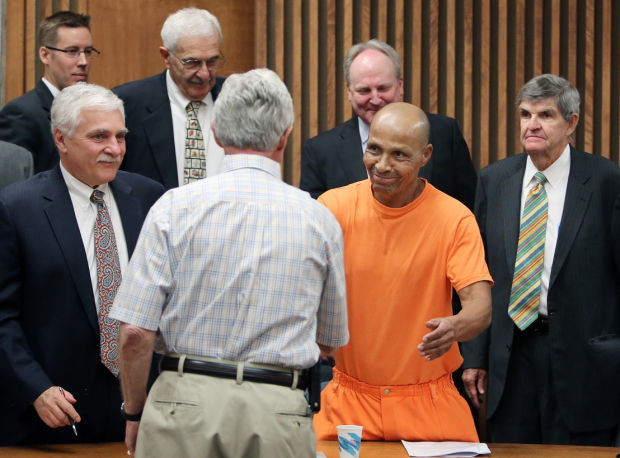Louis Cuen Taylor was driven away from a Tucson prison this afternoon, ending 42 years behind bars for the deadly Pioneer Hotel fire.
“It’s a tale of two tragedies, the Pioneer Hotel fire and my conviction,” Taylor said briefly just after 2:30 p.m. as a group of his lawyers was about to drive him away from the state prison complex on South Wilmot Road. Taylor — dressed in a blue T-shirt and jeans rather than prison-issue orange — said he would have more to say about his case Wednesday during a news conference.
Just hours earlier, Taylor stood in a courtroom where he pleaded no contest in the massive blaze in which 28 people died in 1970 when flames swept through the downtown Tucson high-rise. Another person died from fire-related injuries later.
Tuesday morning the courtroom was overflowing with relatives of some of the victims, court staff and curious bystanders wanting to see Taylor set free.
“Welcome back Mr. Taylor,” Superior Court Judge Richard Fields, said after accepting Taylor’s plea this morning, which sets aside his original conviction — 28 counts of felony murder and a life sentence — and gives him credit for time already served.
Taylor, dressed in an orange Arizona prison-issued T-shirt and orange pants, was 16 years old when he was sent prison.
He has spent 42 years behind bars. Taylor was still being processed for released today and it was not immediately known how long it would be before he is out of custody.
“Mr. Taylor, I stand in front of you today to say I harbor no feeling of ill will or vengeance against you,” said Paul E. d'Hedouville II, the only person to speak at the hearing on behalf of the victims.
D'Hedouville was 4 years old when his father, an attorney, was killed in the fire. He told Taylor of events his father missed, like graduations and weddings and holidays. d'Hedouville who lives in Washington, D.C., told Taylor the justice system worked, both in his conviction and eventual freedom.
“Do as you choose Mr. Taylor, but choose wisely,” D'Hedouville said.
“Do not waste your new beginning at life.”
Read more in tomorrow's Star






